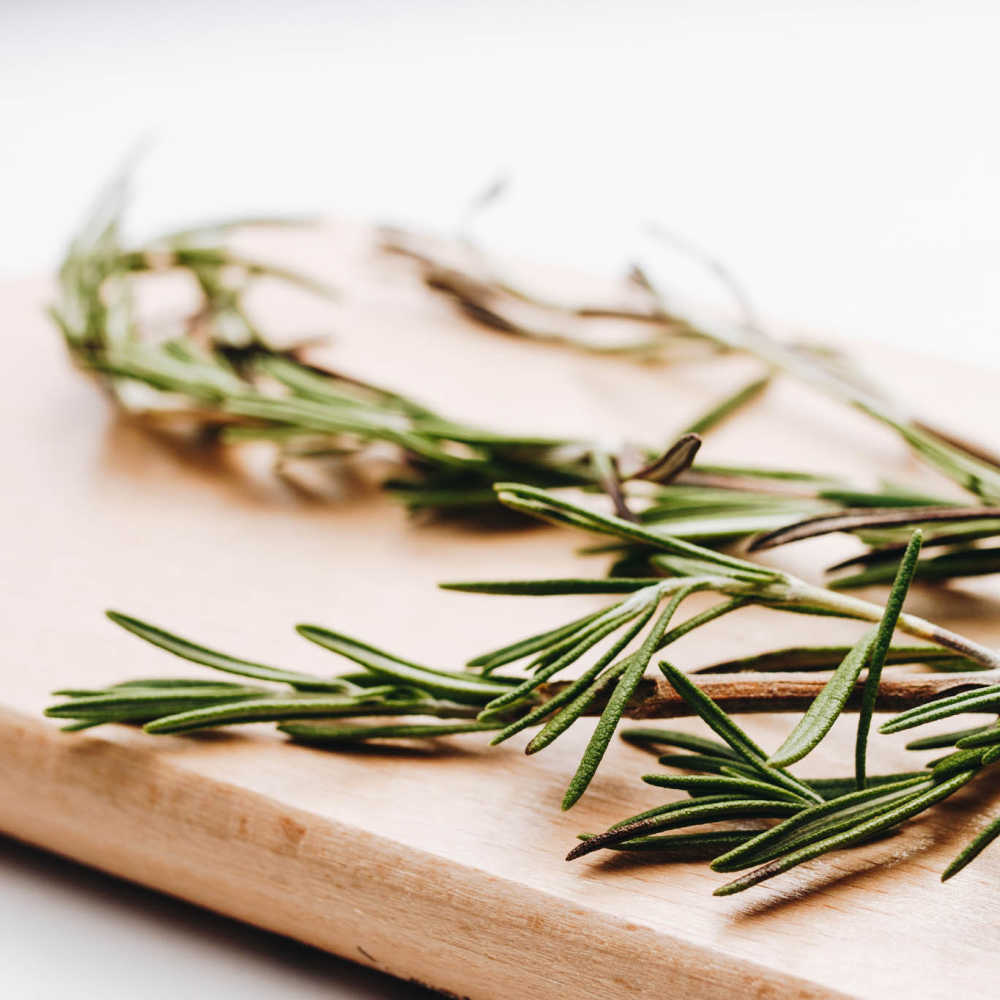
Natural antibiotics have a very important role to play healing all sorts of minor infections.
Which is NOT to say we never need the power of prescribed antibiotics.
Of course we do.
But using natural antibiotics for minor infections helps protect penicillin's power because over use is creating antibiotic resistant bugs.
So I have here a guide to using natural antibiotics in simple home remedies to tackle minor infections from specific bacteria without being a Hogwarts worthy herbologist!!
All the natural antibiotics in the guide are basic herbs, spices & cooking ingredients you very likely already have and there are NO links - I promise - to fancy essential oils or anything else you need to buy!
NB This is NOT medical advice. Infections can be serious. Get urgent medical help if infection persists or spreads or you have a fever or any of these symptoms.
Table of Contents
Contents
The guide will take you through :
- How To Take Natural Antibiotics
- 20 Natural Antibiotics In Your Home
- Quick Natural Antibiotic Remedies
PLUS how to start a healing herb garden of natural antibiotics and why you don't need essential oils.
For help with a specific infection jump to the Natural Remedies section.
Taking Natural Antibiotics
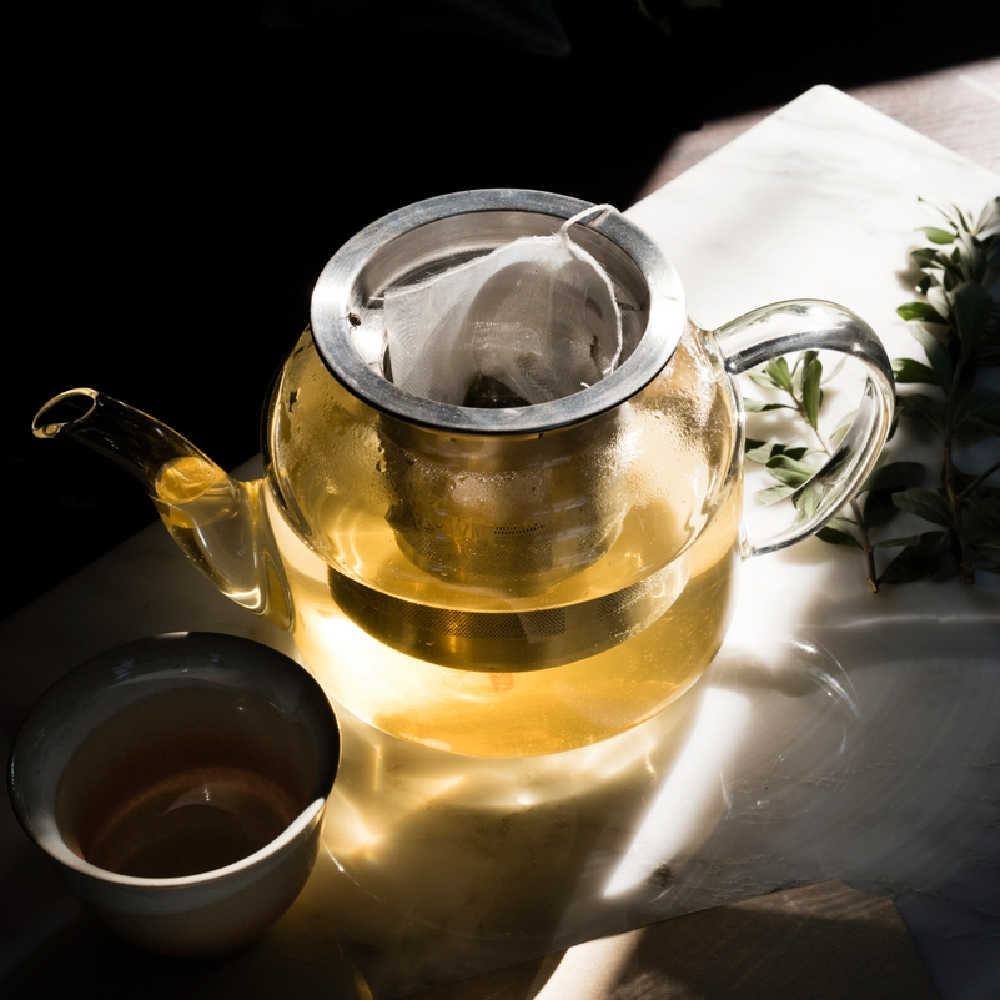
Many of us have a good range of natural antibiotics in our homes without knowing it in the form of :
- Dried or fresh herbs
- Simple spices
- Basic kitchen ingredients e.g. lemons, yoghurt, coconut.
These antibiotics are easy to use with a few techniques that sound crazily complex but are very simple:
Infusions
To make an infusion we simply soak soft leafy herbs e.g. basil, oregano in just boiled water for a short period to make a light solution we can gargle, drink or use to bathe skin.
Decoctions
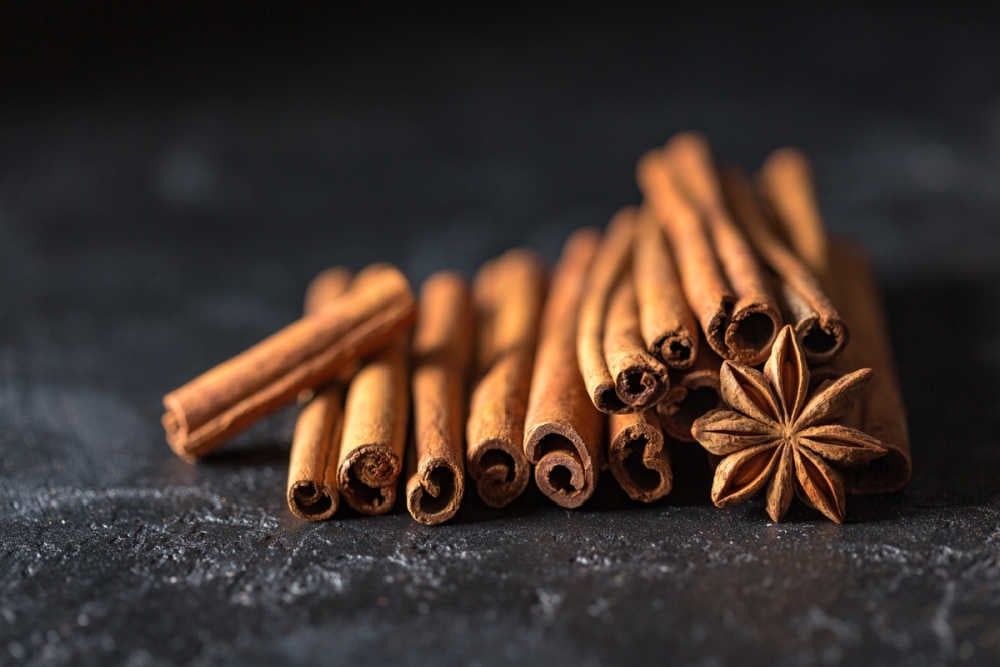
Decoctions are made with the seeds, bark or root of common herbs & spices e.g. fennel, cinnamon, ginger. A higher temperature is needed to release their healing properties so we boil them for five to 10 minutes.
Poultice
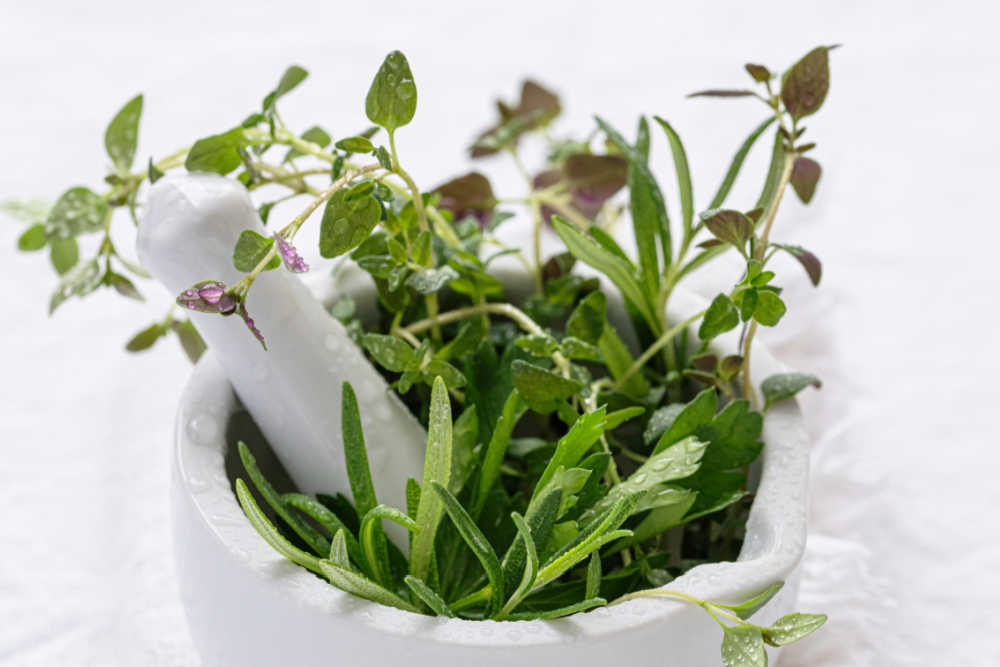
A poultice is simply mashed up soft herbs applied directly to the skin under a cloth or dressing.
It is as simple as that but there are step by step instructions here on how to make a poultice with herbs :
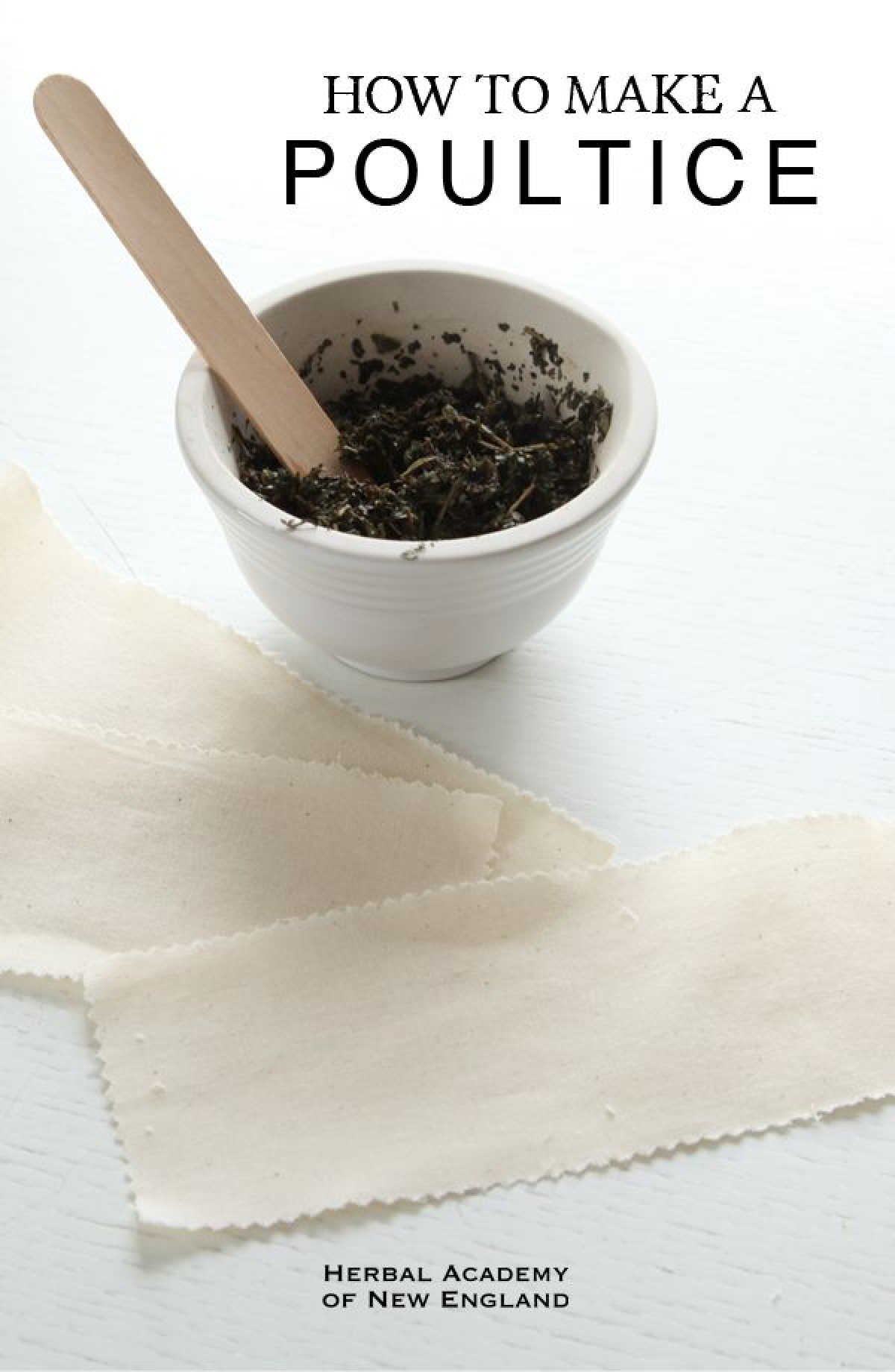
Topical Treatments
A few very handy natural antibiotics in our kitchens e.g. honey, yoghurt can simply be applied directly to our skin as topical treatment.
The Best Times To Take Natural Antibiotics
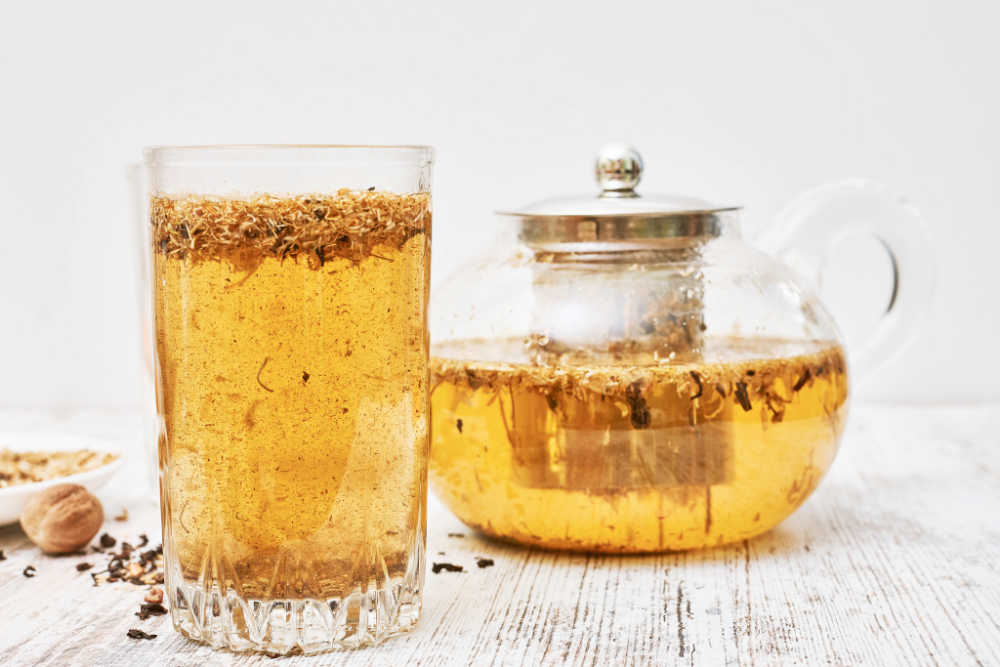
Natural antibiotics are best taken:
- At the first sign of a minor infection
- In response to common triggers for infection e.g. burns, bites & stings
- PLUS preventatively in our diet.
We face numerous bacteria daily and a diet rich in natural antibiotics helps our whole digestive system from mouth to gut keep on top of them.
How Much Natural Antibiotics Should We Take
There are not established guidelines for taking natural antibiotics.
They can have side effects :
- Taken in excess
- With other medicines
- For certain conditions.
So do check for contraindications and only ever take in moderation.
20 Natural Antibiotics
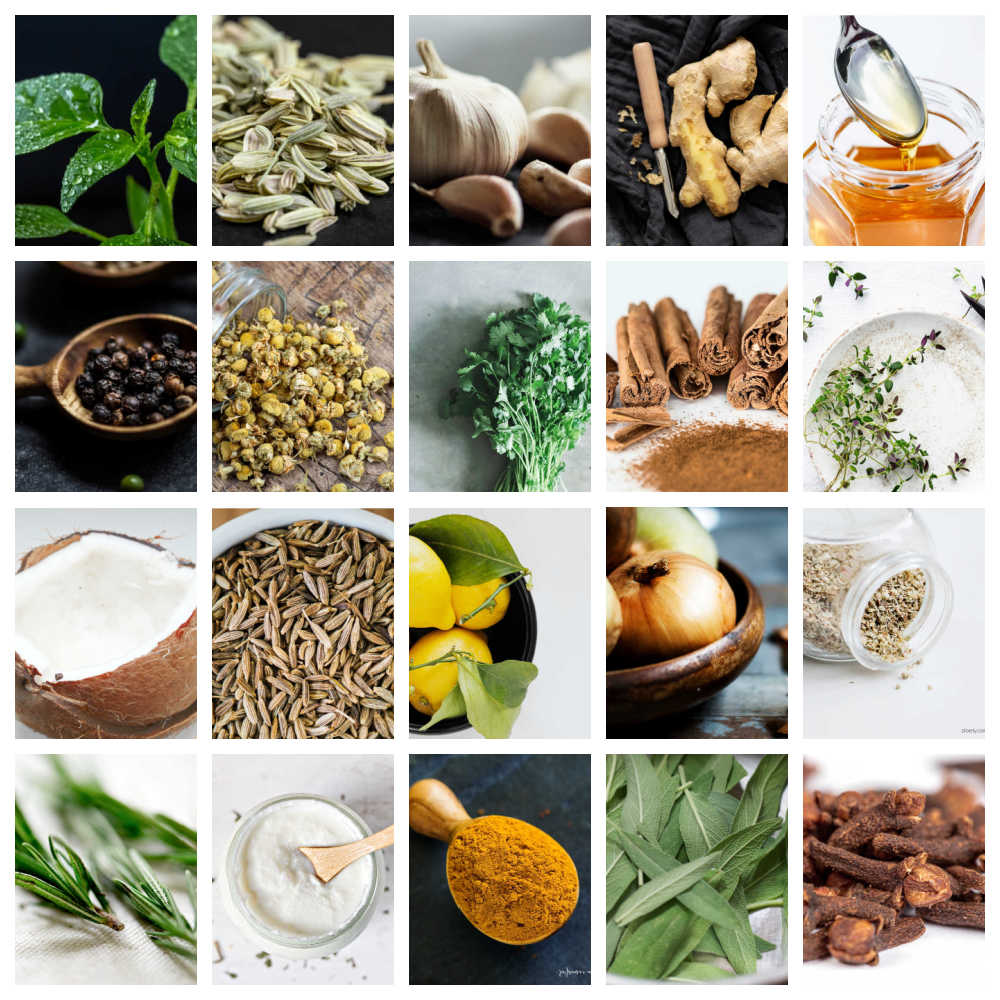
These 20 natural antibiotics were all used traditionally to treat infection but recent research has now shown they can control a range of bacteria:
- Turmeric
- Oregano
- Thyme
- Ginger
- Sage
- Honey
- Basil
- Rosemary
- Garlic
- Fennel Seeds
- Cilantro / Coriander
- Chamomile
- Onions
- Cloves
- Cinnamon
- Cumin
- Black Pepper
- Lemon
- Coconut Oil
- Yoghurt
I'll now take you through how to use each of these natural antibiotics.
But for help with specific infections jump to Natural Antibiotic Remedies.
Turmeric
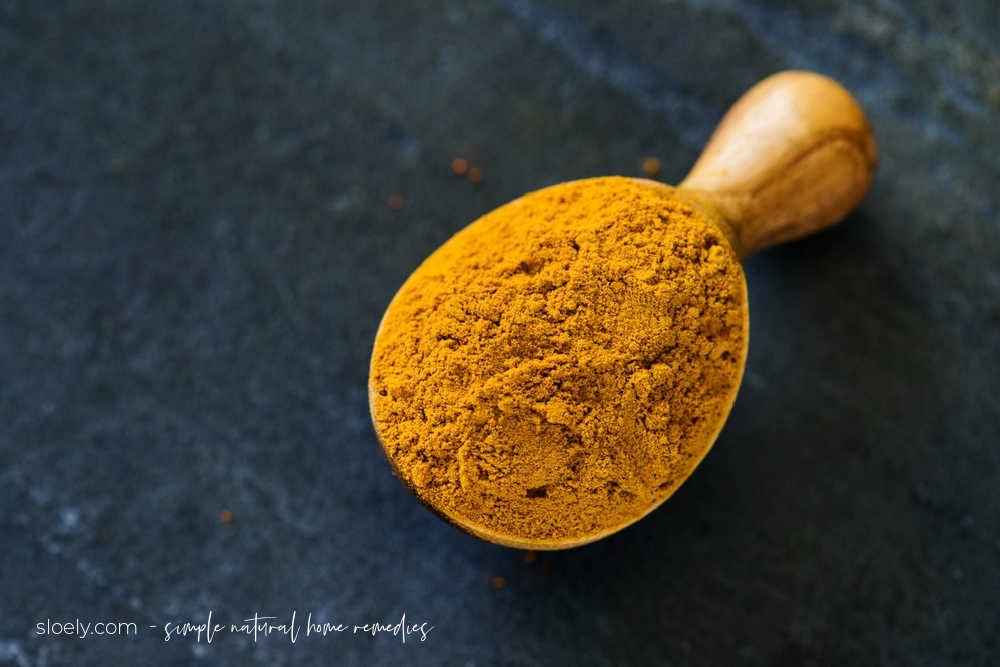
Turmeric has shown antimicrobial powers against common bacteria such as salmonella, E. coli, S. aureas and H. pylori that cause stomach, bladder & respiratory infections.
We can use turmeric in a decoction - simmered for 15 minutes - to ease :
If you are not keen on turmeric's flavour, add ginger and honey both of which are natural antibiotics or drink it in a quick DIY golden latte.
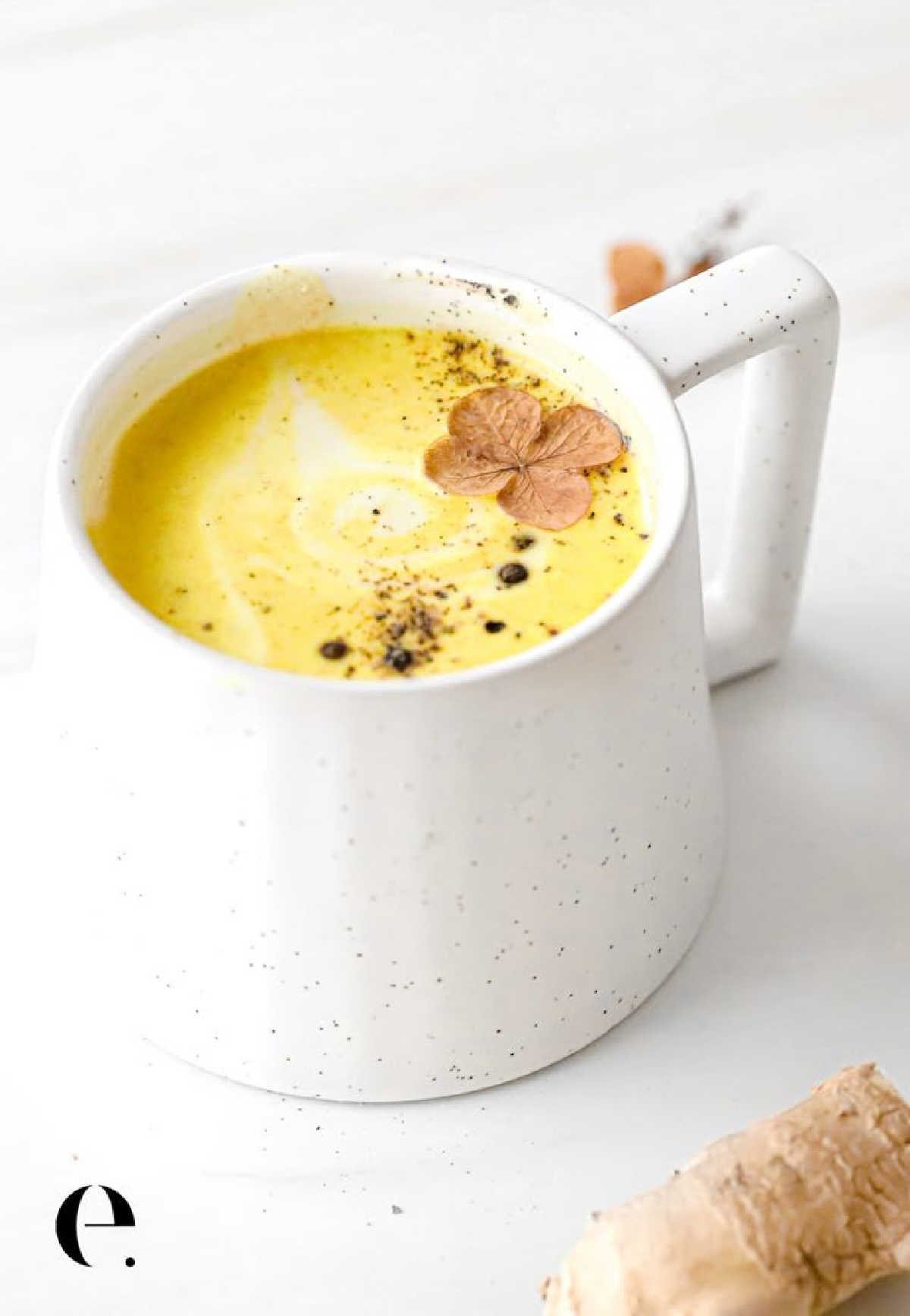
Turmeric can also relieve the fungal infections candida & athlete's foot.
Oregano
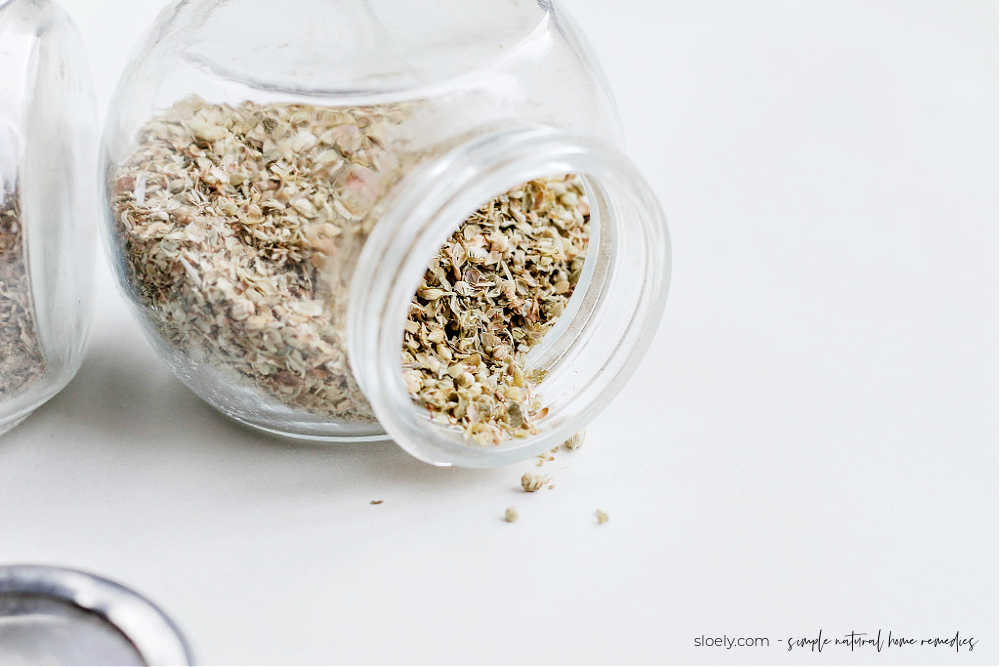
Oregano is a very useful natural antibiotic to have in the kitchen.
It has shown antibacterial powers against bacteria from B. cereus, S saprophyticus, H. pylori, S. aureus & B. circulans to B. lichiniformis.
An infusion of oregano can ease all sorts of minor infections including :
- Skin infections such as boils
- Small cut & wounds
- UTI & bladder infections
- Gastritis
- Tummy bugs
- Acne & blackheads
- Sinus & other infections from colds.
Oregano can also be used as an anti-fungal for athlete's foot, DIY remedy for parasitic pinworms and to help heal sunburn to prevent infection.
You can easily grow oregano indoors and outdoors as a natural antibiotic.
Thyme
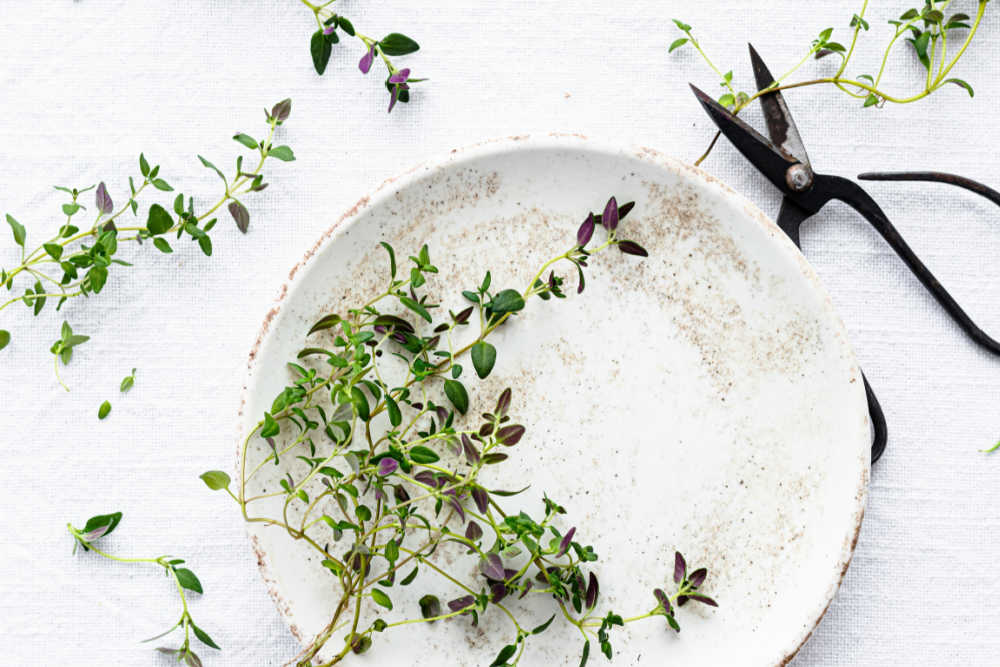
Tiny thyme leaves rich in thymol are a natural antibiotic powerhouse which can block bacteria behind gut, skin and mouth & throat infections.
So drink, gargle or apply an infusion of thyme as a natural antibiotic for :
- Tummy bugs
- Gastritis
- Diarrhoea
- Bloating
- Bladder infections
- Minor cuts and grazes
- Sore throats
- Mouth infections
Thyme can also clear pinworm & head lice parasites, fungal ringworm & athletes foot PLUS viral cold sores.
Thyme is easy to grow from cuttings.
Ginger
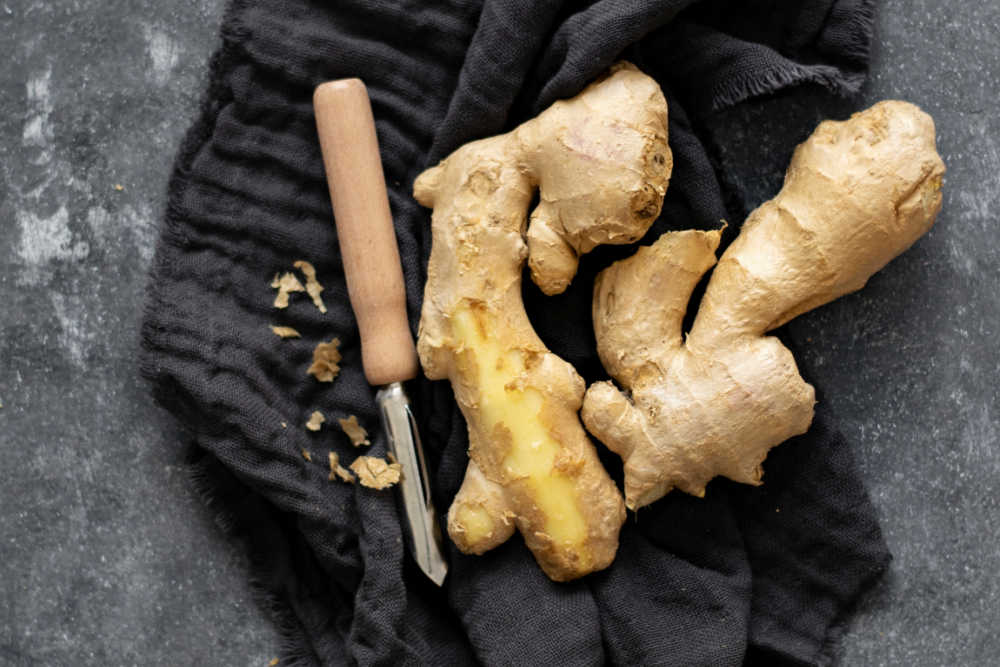
Ginger is a very useful antibiotic as it is antiemetic - relieves nausea - so is gentle to take for tummy bugs.
But it is still powerful.
Research shows it blocks a range of bacteria from H. pylori to E. coli and is an anti-viral for colds whilst also having anti-inflammatory powers.
You can make ginger decoctions with ginger root and powder to ease:
- Gum disease
- Gastritis
- Tummy bugs
- Sinus infections
- Chesty coughs
- Sore & swollen throats
You can add honey once ready or for children add ginger to warmed milk.
Ginger can also lower blood sugar and help with morning sickness, period pain, cold sores, pinworms, constipation, dandruff & bloating. You can also drink ginger headache tea for tension headaches.
Sage
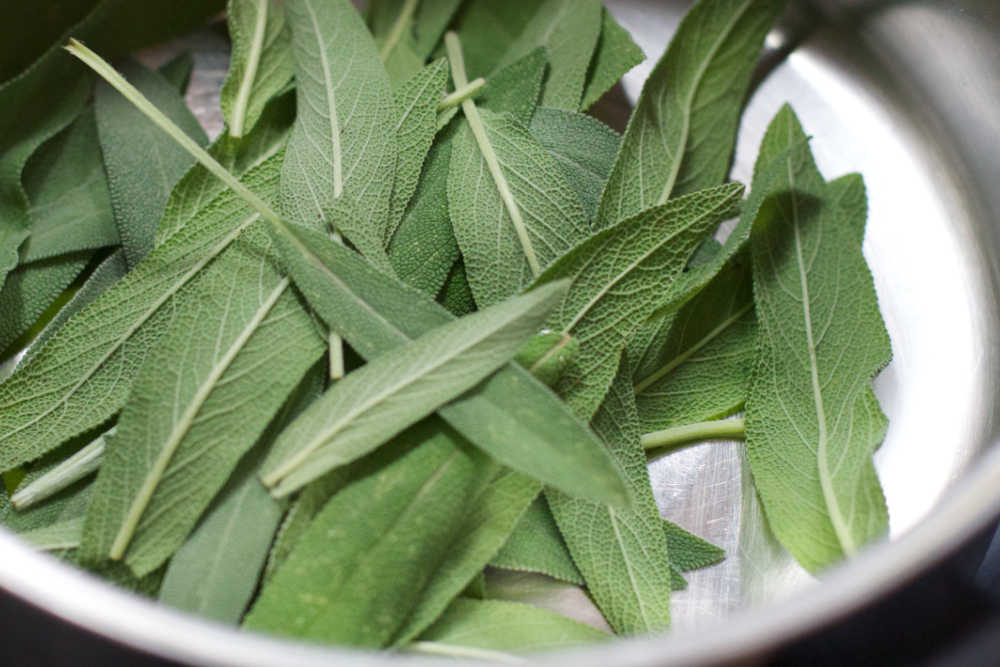
Don't save sage for holiday stuffing. It has shown antimicrobial activity against bacteria from Streptococcus mutans to K. pneumoniae.
Sage can be drunk or gargled in an infusion or applied as a poultice to ease minor infections including:
- Mouth infections - that cause dental plaque and bad breath
- Boils
- Tummy bugs
- Sore throats
- Chest infections - it is worth drinking preventatively if you have a chesty cold or cough.
- Urinary tract infections especially recurrent ones in the elderly.
It is easy to grow your own sage.
Honey
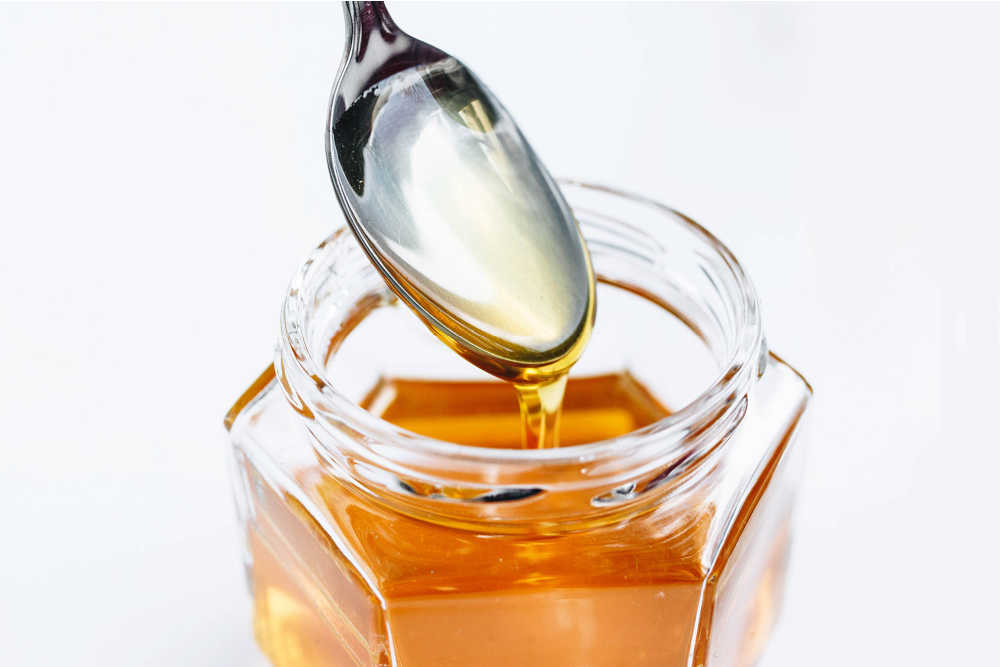
Honey really has the wow factor in store cupboard natural remedies.
It is not just an antibiotic. It is also a:
- Natural antihistamine
- Anti-fungal
- Anti-viral.
Honey can also help repair the lining of our digestive and respiratory system to keep bacteria out.
It can help relieve all all sorts of minor conditions including :
- Mosquito bites
- Acne
- Sunburn
- Gastritis
- Heartburn
- Sinus congestion
- Sore throats
- Colds
- Coughs
- Dandruff
- Viral cold-sores.
Basil
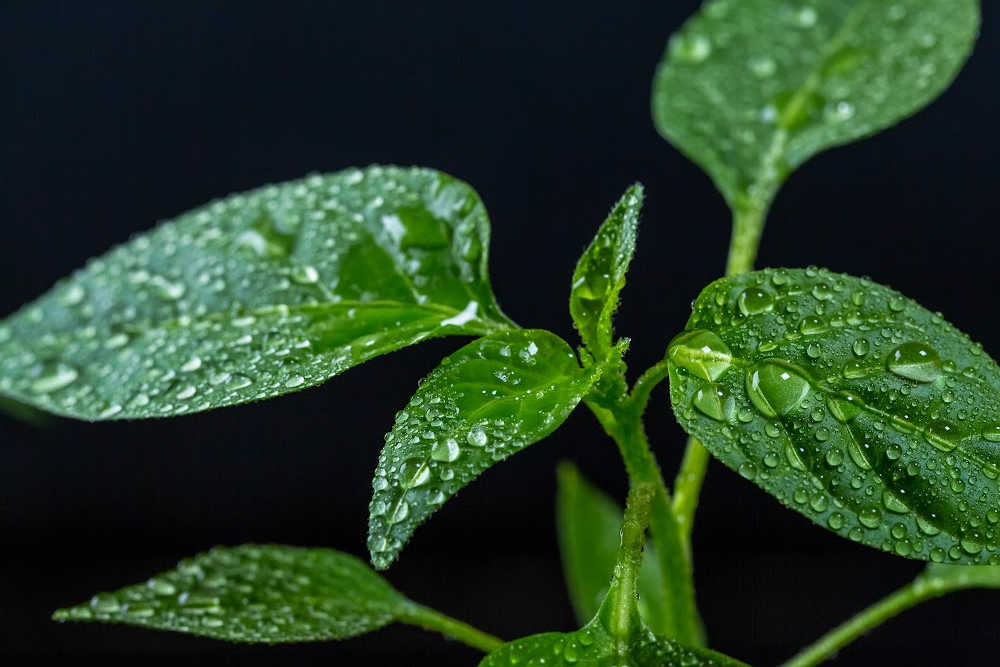
Basil is another naturally antibiotic herb many of us have in our kitchen.
Research shows it inhibits growth of drug resistant E. coli. In a simple infusion or poultice it can be used to help ease all these infections :
- Acne & blackheads
- Ear
- Tummy bugs
- Urinary
- Respiratory
- Cuts & grazes
Basil can also help clear pinworms.
Fresh basil can cause tummy bugs as it doesn't keep well, so it is a good herb to grow to pick as needed.
Rosemary
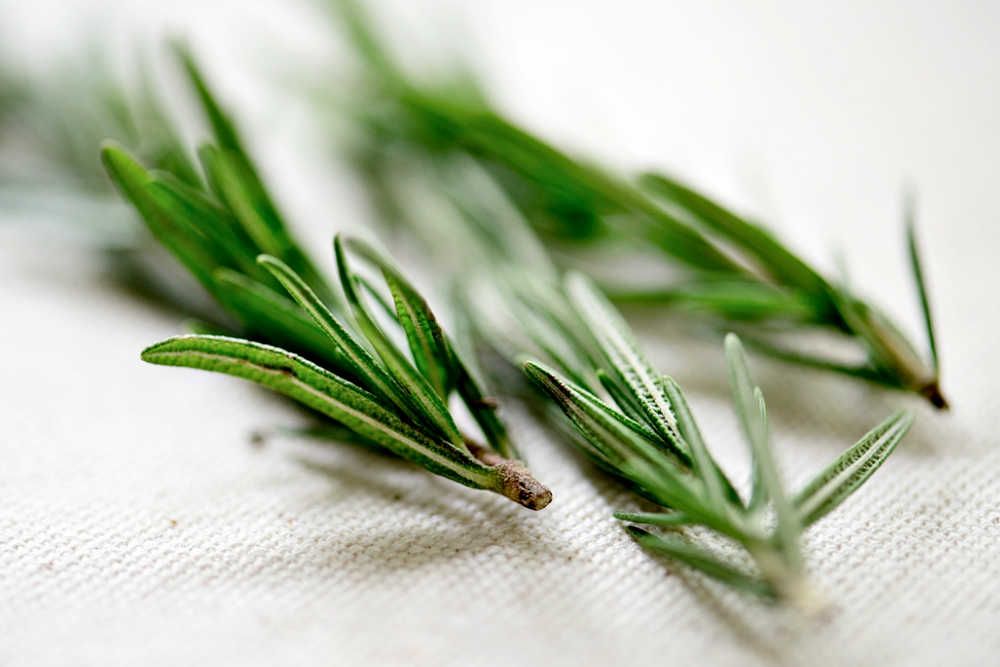
Rosemary has shown antimicrobial activity against E. coli, salmonella, listeria, S. aureus and B cereus.
Rosemary can be used in natural antibiotic infusions, poultices and steams against :
- Tummy bugs
- Boils
- Cuts & grazes
- Nasal & sinus infections - use as a gentle steam with lightly steaming but not scorching hot water
- Spots & blackheads.
You can easily grow rosemary but it does spread so is better for bigger herb gardens or as hedging that helps keep cats out of gardens!!
Garlic
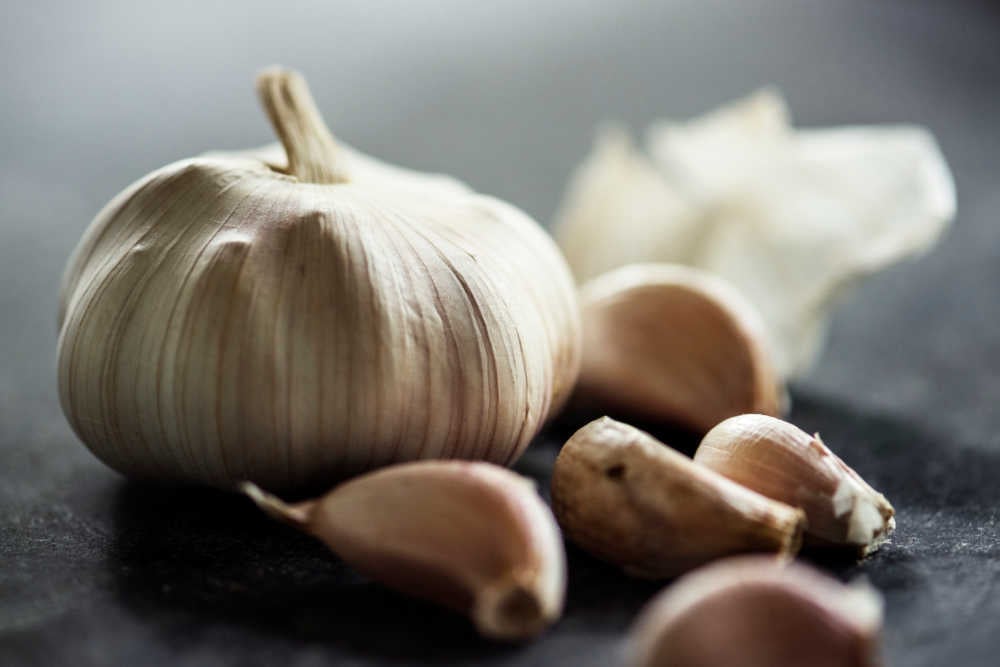
Garlic is a valuable antibiotic as it:
- Helps balance our immune system to stop over react to infection
- Contains allicin which is active against a range of bacteria including clostridium difficile.
It can be used in remedies against :
- Oral infections
- Tummy bugs
- Colitis
- Sinus infections
- Gut infections from constipation
- Chest infections from coughs.
Garlic can also be a helpful part of candida cleanse, in getting rid of pinworms and against viral cold sores and fungal athlete's foot.
It is easy to grow garlic to protect other plants from pests & disease.
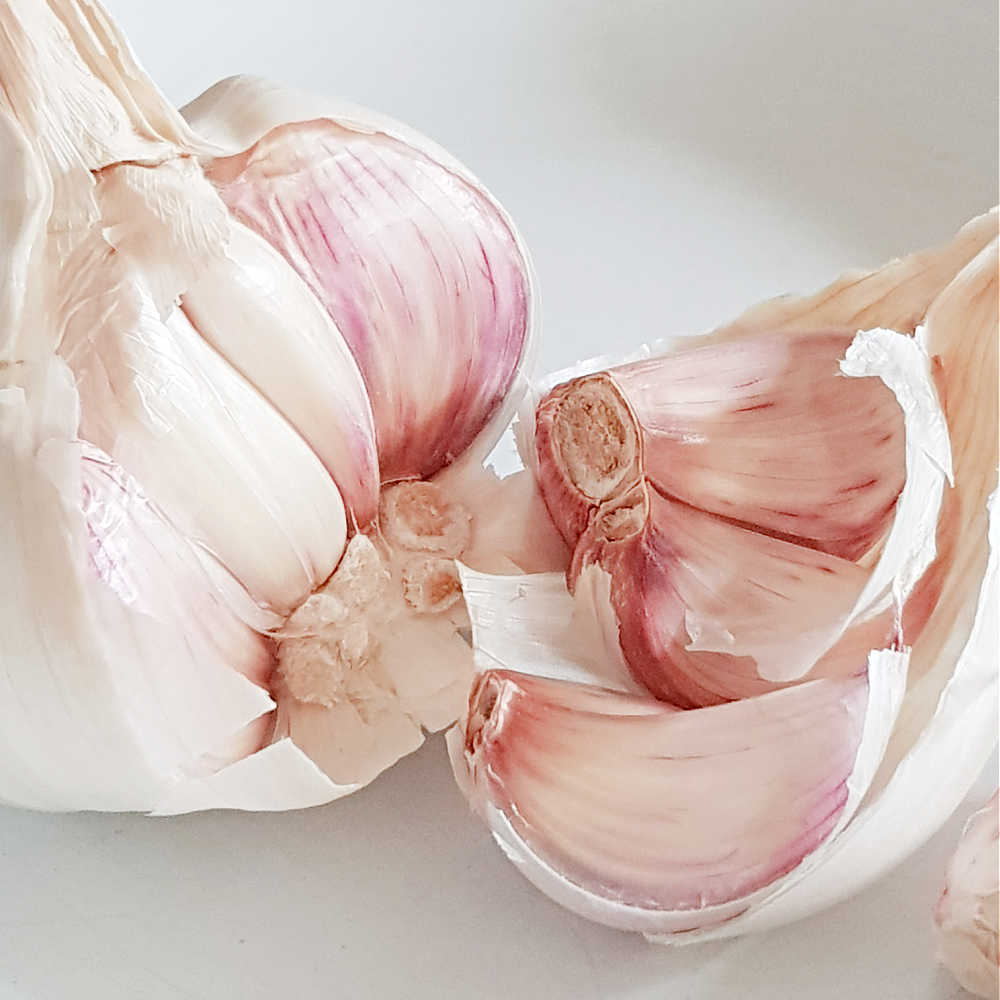
Simply chewing raw garlic releases the allicin. Mix with honey - also antibiotic - to make more palatable.
Or you can seep crushed garlic for just a few minutes to make an infusion to which you add honey.
We can eat too much garlic and 1-2 cloves a day is commonly regarded as sufficient. Garlic can aggravate :
- IBS
- Acid reflux & heartburn
- Non-bacterial gastritis although it can control H. pylori infections.
Fennel Seeds
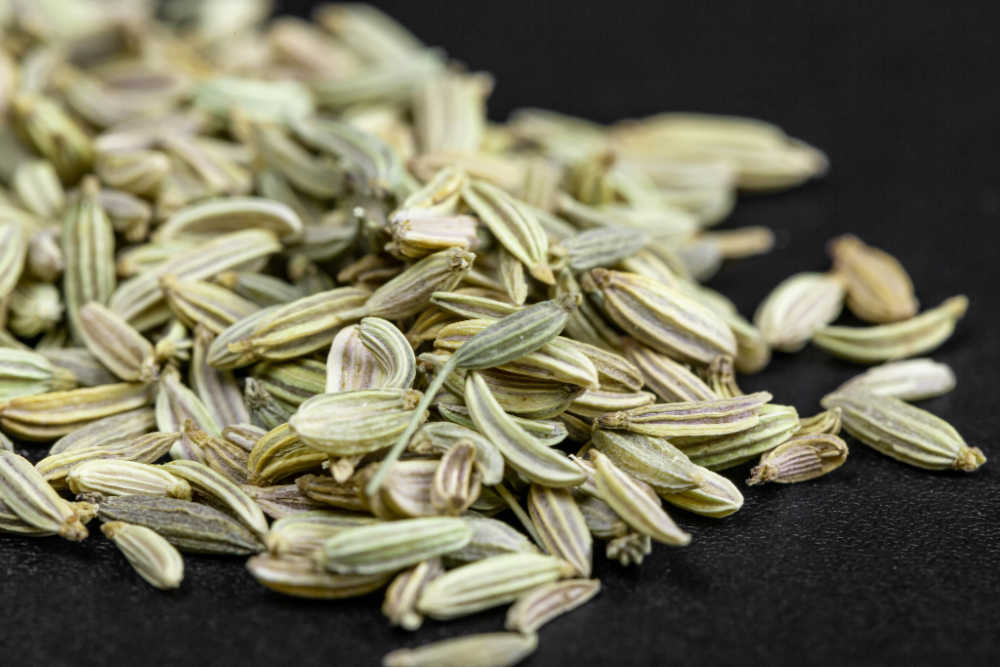
The traditional healing powers of naturally antibiotic fennel seeds are now supported by recent research.
Fennel seeds can help with :
- Bad breath
- Sinus infections
- Chesty coughs
- Urinary tract infections
- Gut infections causing bloating.
To make a simple fennel seed decoction to sip or gargle :
- Slightly crush 1 teaspoon of fennel seeds
- Add to a small pan with
- 1 cup or so of water
- ½ teaspoon of ginger
- Bring to boil
- Simmer for 10 minutes
- Then strain
- Add a teaspoon of honey if preferred.
Cilantro & Coriander
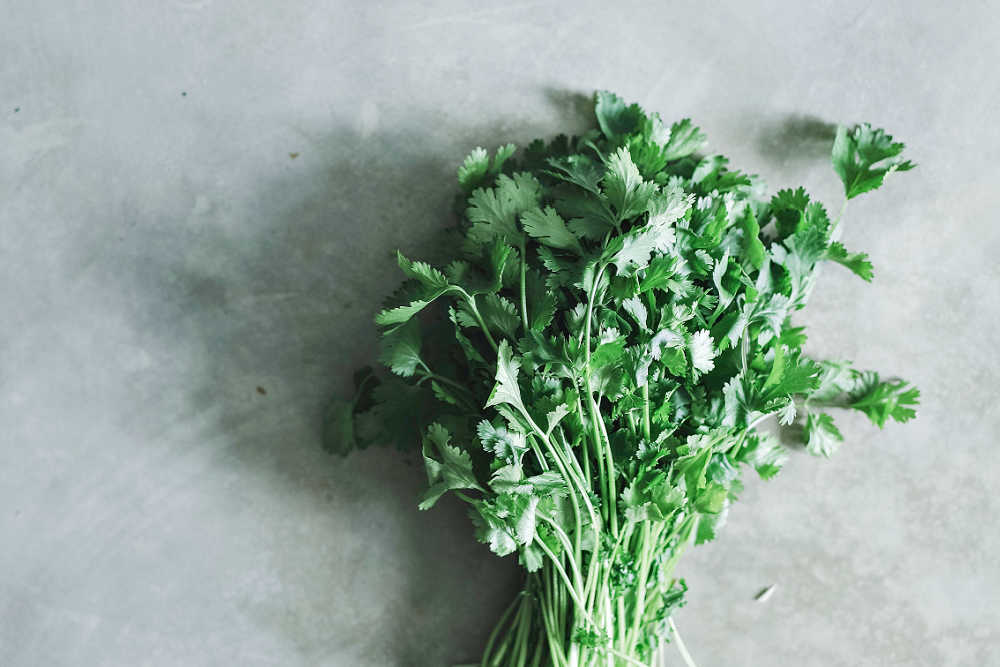
Coriander aka cilantro has shown antimicrobial activity against salmonella and S. aureus.
An infusion of cilantro leaves or decoction of coriander seeds can help to relieve mild :
- Tummy bugs
- Chesty coughs
- Bladder infections.
You can easily grow cilantro to use in natural remedies and as a gut healthy garnish for everyday meals.
Chamomile
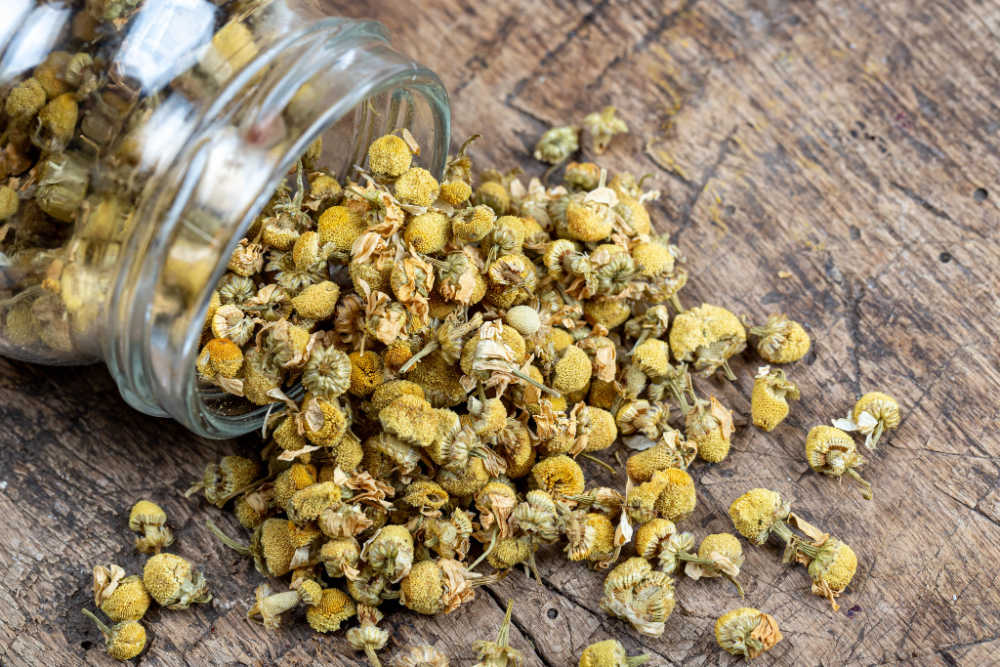
Chamomile is a very gentle natural antibiotic that can help us heal :
- Colds
- Tummy bugs
- Skin infections.
It seems to help our bodies switch from fighting to healing mode so we recover better from sickness.
Chamomile can also give natural headache relief and help remove blackheads in DIY facials.
Onions
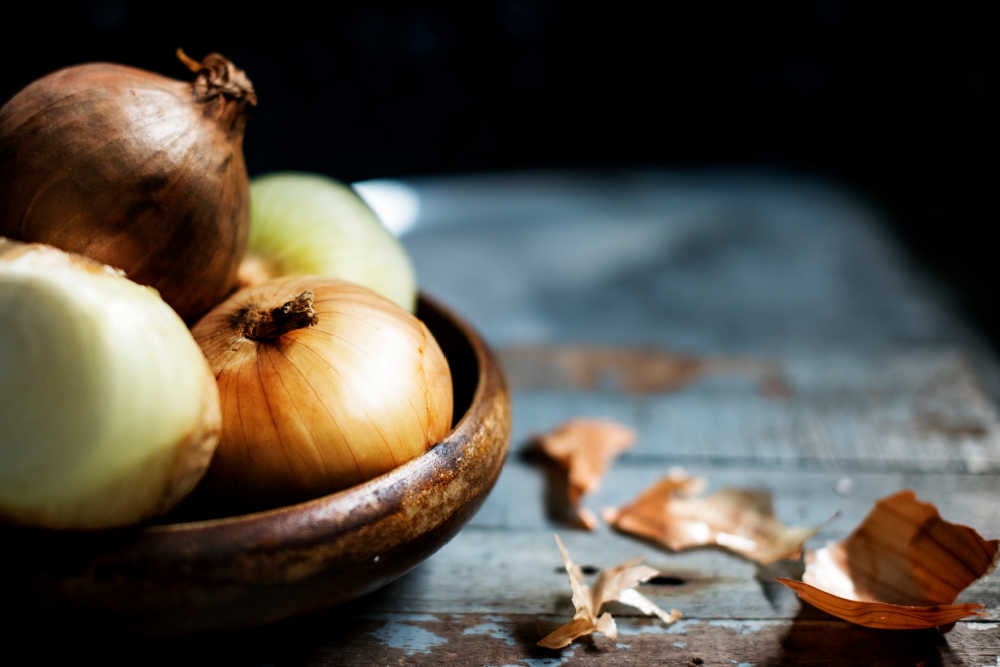
Onions like the rest of the allium family are powerhouse anti-inflammatory natural antibiotics.
They can work as DIY remedies for :
- Tooth infections
- Gum infections
- Tummy bugs
- Chest coughs.
Onion infusions aren't the loveliest so a simple onion & garlic broth is a good way to enjoy their benefits.
Some people also swear by an onion poultice for chesty coughs.
Go easy on onions if you suffer from :
- IBS
- Acid reflux & heartburn
- Non bacterial gastritis (i.e. painful gas not tied to H. pylori infection).
Cloves
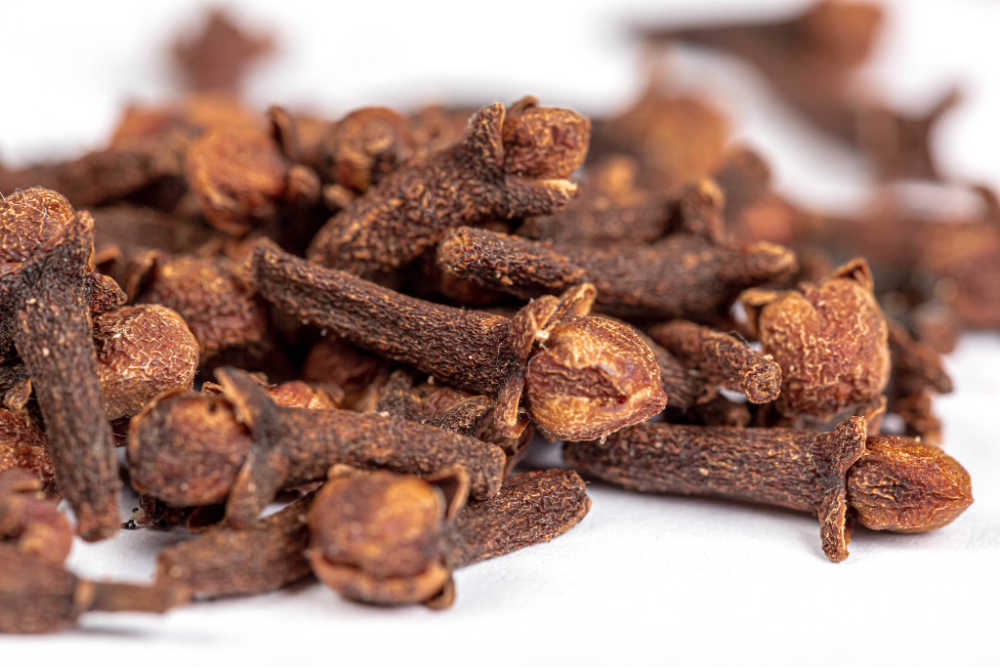
We forget about cloves outside the Christmas season but they are in fact a broad range natural antibiotic
And also have anaesthetic powers so can help with painful infections.
You can use a decoction of cloves with ginger & cinnamon to ease :
- Tooth ache
- Gum disease
- Bacterial tooth plaque
- Bad breath
- Tummy bugs.
Cloves may also help heal ulcers and damaged stomach lining from gastritis. Clove tea can also provide instant headache relief and cloves can even help to repel moths!!!
Cinnamon
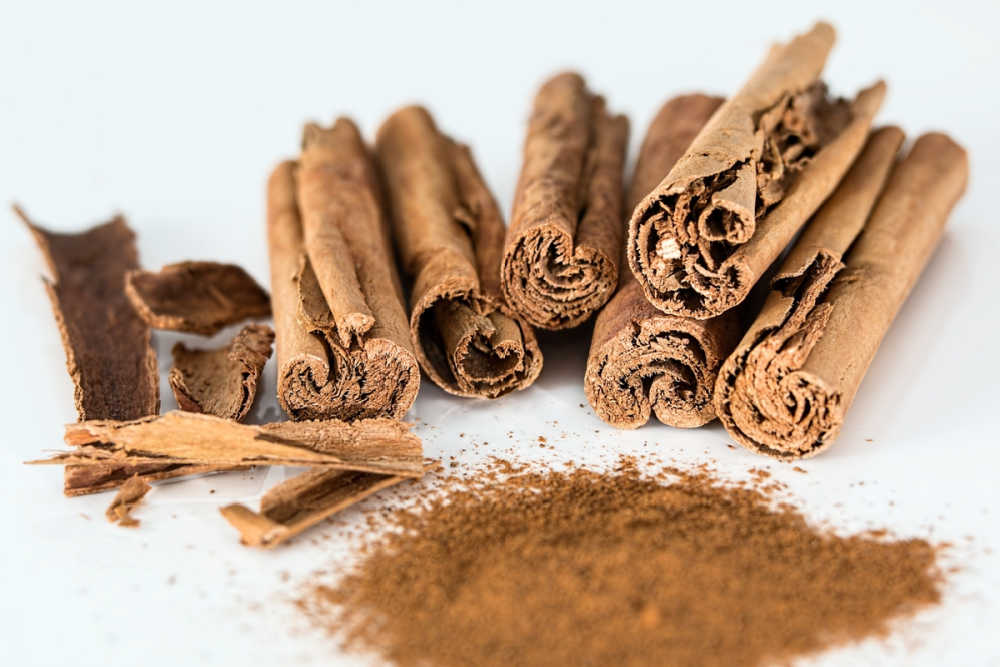
Cinnamon is another natural antibiotic - plus anti-inflammatory - that acts against multiple bacteria including salmonella and E. coli.
Make a decoction of cinnamon bark or powder to sip or gargle for :
- Tooth ache
- Gum infections
- Bad breath
- Tummy bugs
- Diarrhoea.
As an anti-inflammatory it can also ease inflamed sinuses & throats.
And even get rid of ants naturally!!!
Cumin
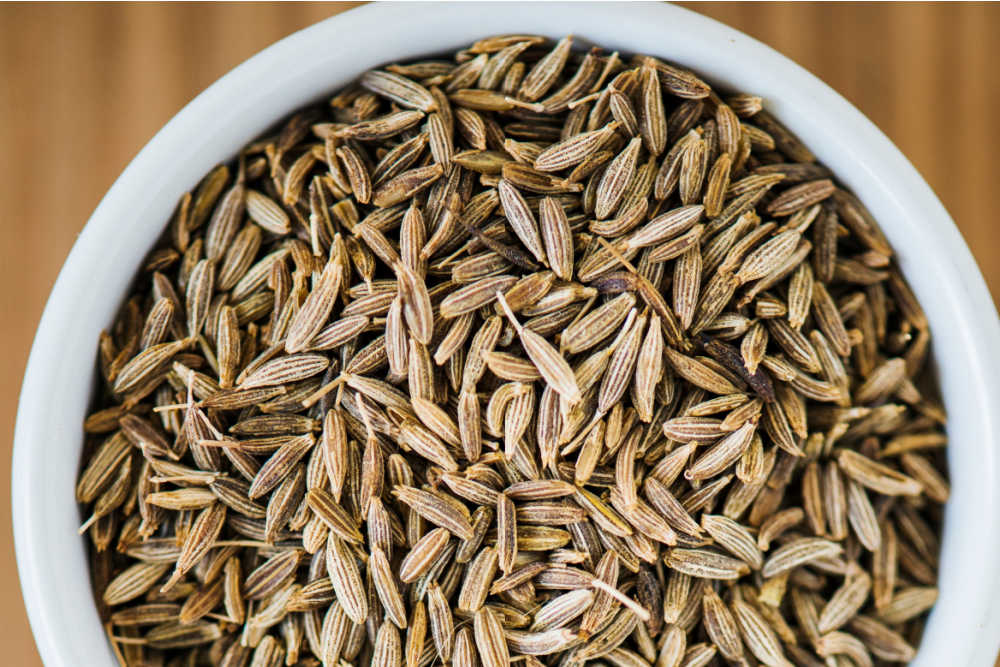
Cumin has a wide range of health benefits and as a natural antibiotic is active against E. coli & S. aureus.
It can ease minor infections such as :
- Tummy bugs
- Cystitis
- Boils.
It is not great drunk as an infusion but you can add to a turmeric latte.
As an iron rich food that can lower blood sugar cumin is a good spice to add to everyday meals. I often add it to quick green & hearty fall soups.
Black Pepper
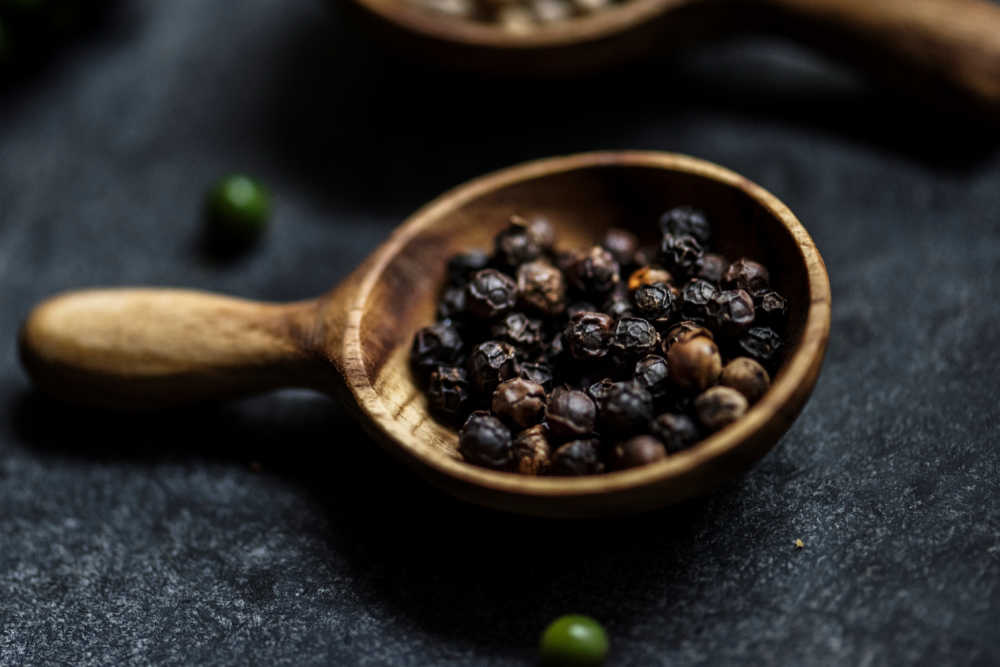
Black pepper is an age old antibiotic now shown to inhibit bacteria such as E. coli and S. aureus.
Flavouring food with black pepper keeps our gut rich in an antibiotic that blocks digestive infections.
It can also be used as a remedy to unblock sinus congestion.
As ever moderation is key. And black pepper is NOT great for some of us.
Both black & red pepper release pepsin an enzyme for digesting meat that in excess triggers acid reflux. Pepper also painfully aggravates stomach lining damaged by gastritis.
Lemon
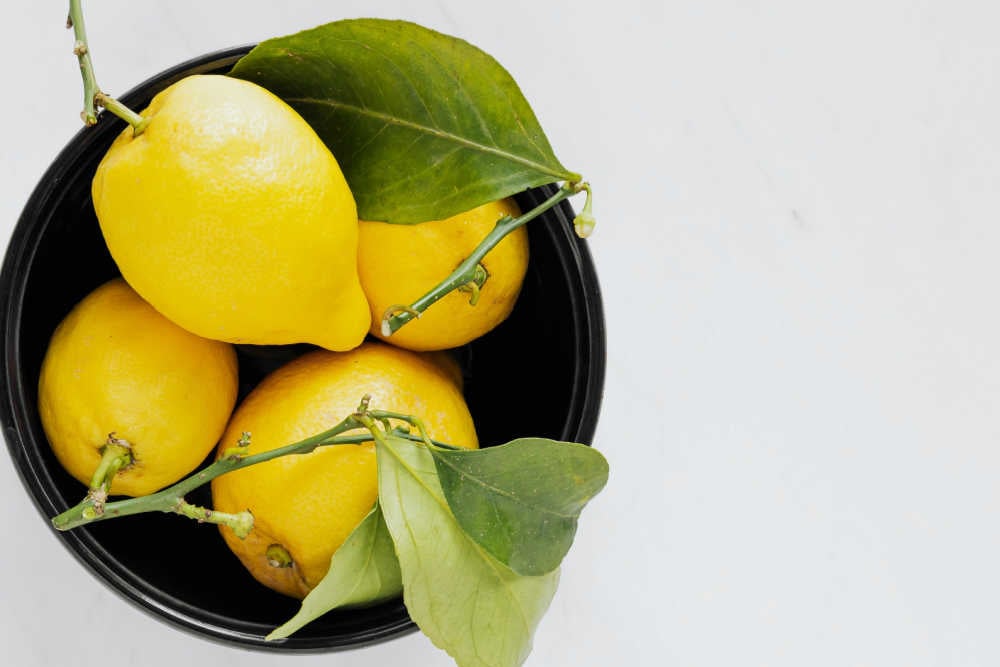
Lemons have long been used in remedies, cleaning products & preservatives for their natural antimicrobial powers and can see off multiple bacteria such as E. coli.
Lemons can be used to relieve and prevent infection from :
And help ease pregnancy nausea.
Just a small squeeze boosts iron absorption from green vegetables and protein digestion from red meat.
However, lemons are highly acidic and trigger release of the enzyme pepsin which can aggravate :
Coconut Oil
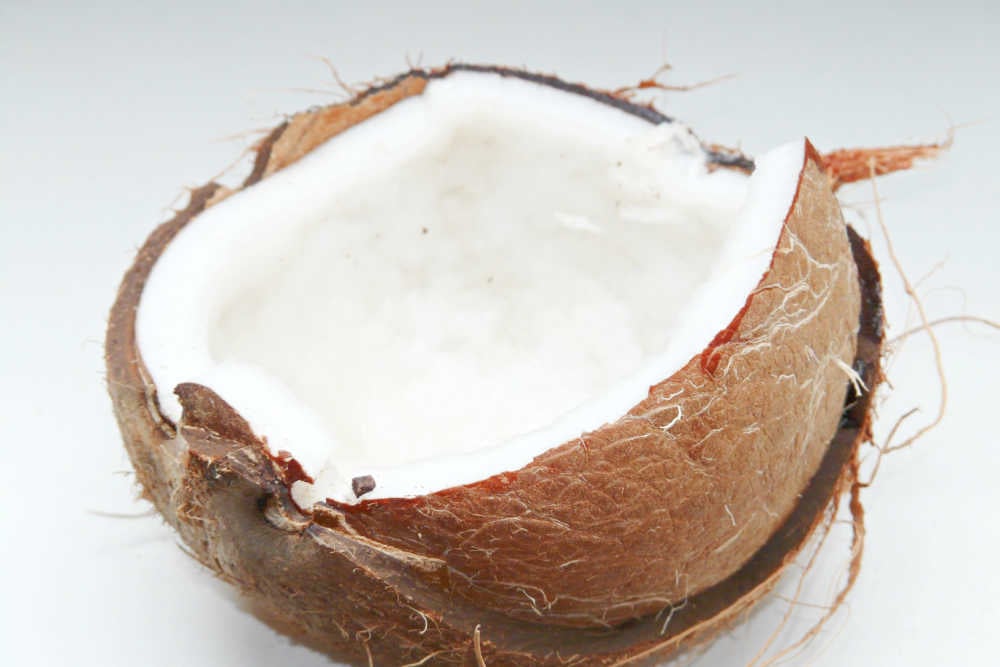
Coconut oil is a super useful natural antibiotic in our kitchen cupboards.
Like honey, coconut oil is also anti-fungal, anti-inflammatory and boosts healing and can be easily :
- Digested
- And applied to our skin.
Coconut oil can ease a wide range of infections triggered by bacteria, virus, fungus or allergy including :
- Psoriasis
- Acne & blackheads
- Cold sores
- Ring worm
- Candida
- Mouth infections
- Tooth ache
- Athlete's foot
- Dandruff
- Pin worms
- Chest infections
- Head lice
- Sunburn.
It can also be used as a wonderful home remedy for frizzy hair.
Yoghurt
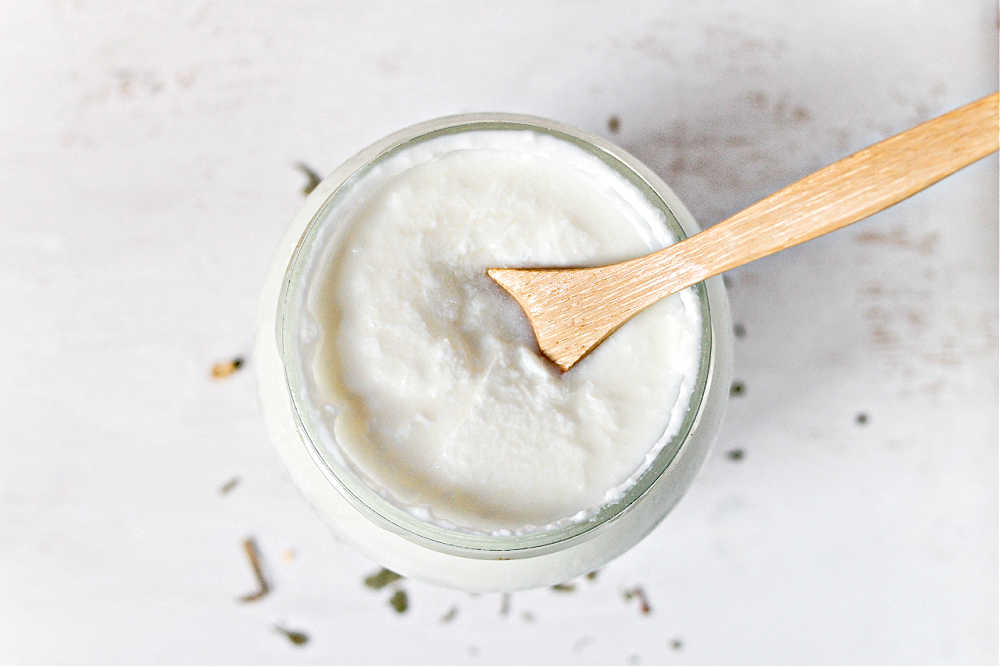
Many of us now know probiotic yoghurt can help restore gut health.
But it can also be used as a natural treatment to ease infections from :
Yoghurt is also rich in magnesium which balances our hormones and hence helps stabilise our immune system's response to infection.
Natural Antibiotic Remedies
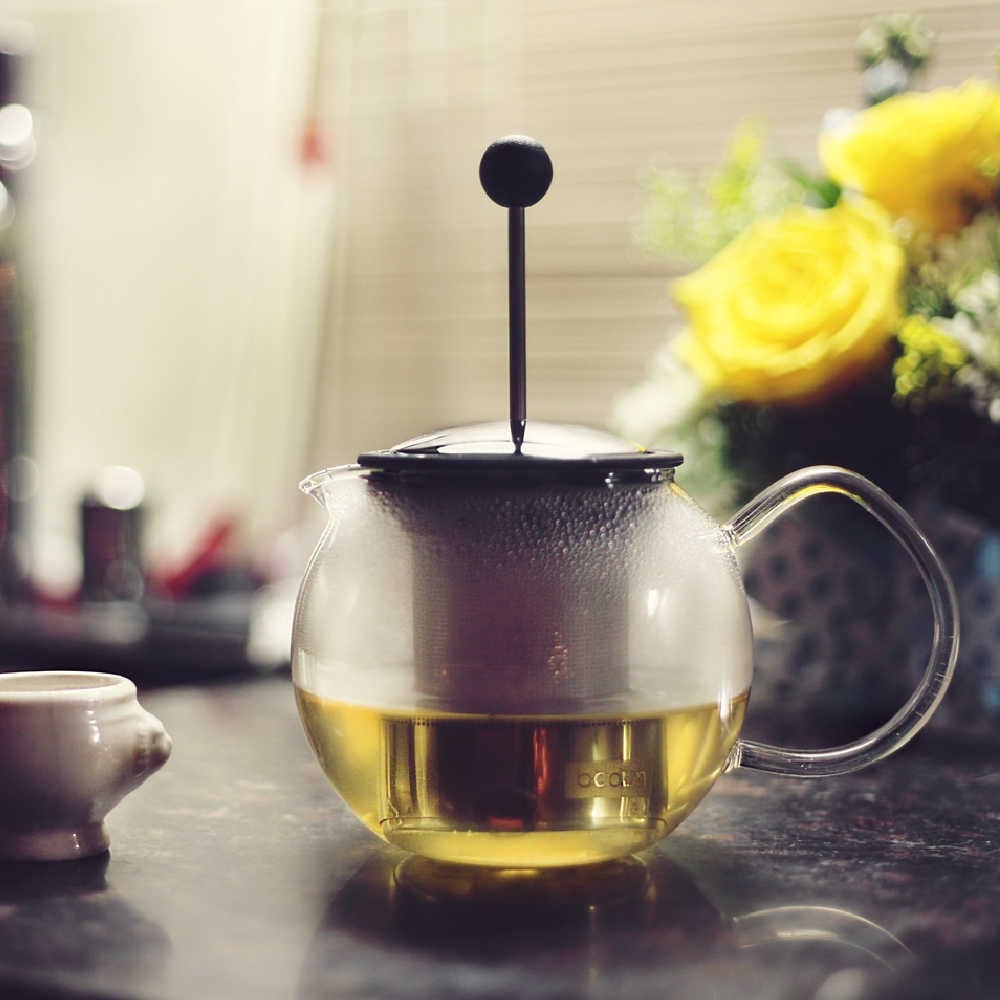
Minor infections can be eased fast with natural antibiotics we already have in our home or garden.
Use this section of the guide to learn which natural antibiotics best help different infections :
These natural antibiotics also ease common non-bacterial infections :
Most infections can be eased by various herbs, spices or kitchen ingredients so we don't have to take a single remedy in excess.
Seek urgent medical help for persistent or spreading infection, fever or any of these symptoms.
Digestive Infections
Simple DIY herbal teas can ease common digestive infections :
- Bladder, Cystitis & UTI : Oregano, Thyme, Sage, Basil, Fennel seeds, Cilantro, Cumin
- Bloating : Thyme, Ginger, Fennel seeds, Cinnamon
- Diarrhoea : Thyme, Cinnamon
- Gastritis : Turmeric, Oregano, Thyme, Ginger, Honey, Cloves & for more help read about these
- Tummy Bugs : Oregano, Thyme, Ginger, Sage, Basil, Rosemary, Garlic, Cilantro, Chamomile, Onions, Cloves, Cinnamon, Cumin
For more advice read these guides :
Ear, Nose & Throat Infections
- Blocked Sinus : Turmeric, Oregano, Ginger, Honey, Rosemary, Garlic, Fennel seeds, Cinnamon, Black pepper, Lemon
- Colds : Oregano, Ginger, Garlic, Chamomile, Lemon
- Chesty Coughs & Colds : Sage, Honey, Garlic, Fennel seeds, Cilantro, Onions, Coconut oil
- Coughs : Ginger, Honey, Basil, Lemon
- Ears : Basil
- Sore Throat : Turmeric, Thyme, Ginger, Sage, Honey, Cinnamon, Lemon, Yoghurt
For more advice read these guides :
Oral Infections
- Bacterial Plaque: Sage, Cloves
- Bad Breath : Fennel seeds, Cloves, Cinnamon
- Gum Disease : Ginger, Onions, Cloves, Cinnamon
- Mouth Infections : Thyme, Sage, Garlic, Onions, Coconut oil
- Toothache : Onions, Cloves, Cinnamon, Coconut oil
Skin Infections
- Acne: Honey, Basil, Coconut oil, Cinnamon
- Bites & Stings : Honey, Basil, Coconut oil, Turmeric, Lemon, Yoghurt
- Boils : Oregano, Sage, Rosemary, Cumin
- Minor Cuts & Grazes : Oregano, Thyme, Basil, Rosemary, Chamomile
- Mosquito Bites : Honey, Lemon, Thyme, Basil, Rosemary, Chamomile
- Psoriasis : Coconut oil, Turmeric
For more advice read these guides :
Fungal Infections
- Athletes Foot : Thyme, Garlic, Turmeric, Rosemary, Cinnamon, Coconut oil
- Candida : Turmeric, Garlic, Coconut oil, Cinnamon, Oregano
- Dandruff : Honey, Coconut oil, Yoghurt, Ginger
- Ring Worm : Thyme, Coconut oil, Garlic, Oregano
For more advice read these guides :
Parasite Infections
- Head Lice : Thyme, Coconut oil
- Pinworms : Oregano, Thyme, Ginger, Basil, Garlic, Coconut oil
For more help read these guides :
Viral Infections
- Cold Sores : Thyme, Ginger, Honey, Garlic, Coconut oil
For more help read this guide :
Natural Antibiotics & Essential Oils
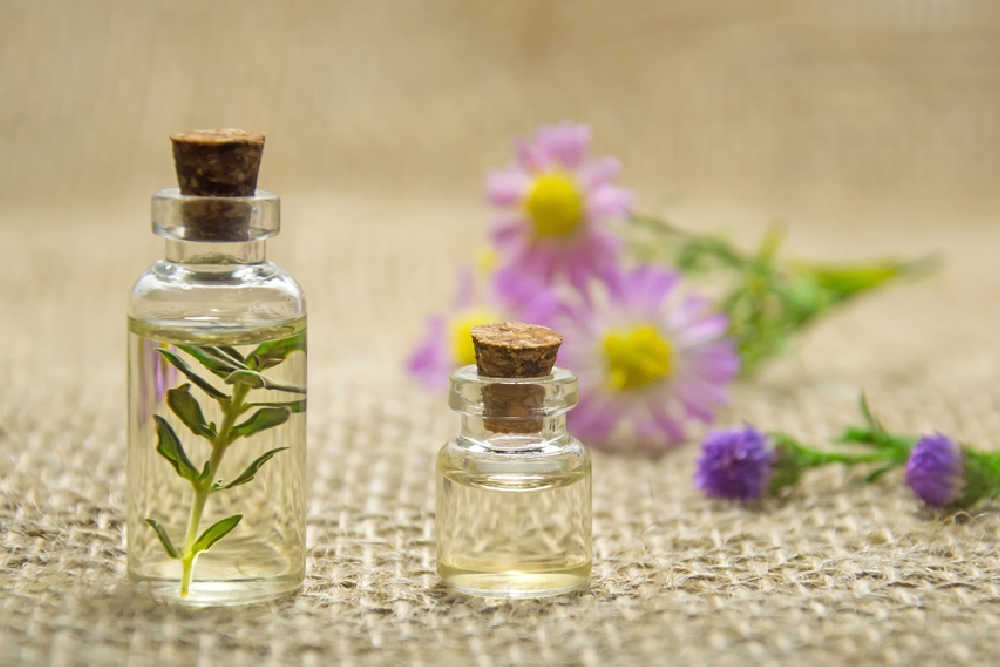
Essential oils are concentrated oils from naturally antibiotic plants.
They can be used in natural antibiotic remedies but are potent so must be taken with great care.
Sadly, some essential oil businesses are pyramid schemes who profit by signing up sellers and the internet is deluged in poor quality oils.
I use very few essential oils and buy from a 200 year old local herbalist. The remedies in this guide do NOT need oils but if you do use them only buy from trusted suppliers.
Growing Natural Antibiotics
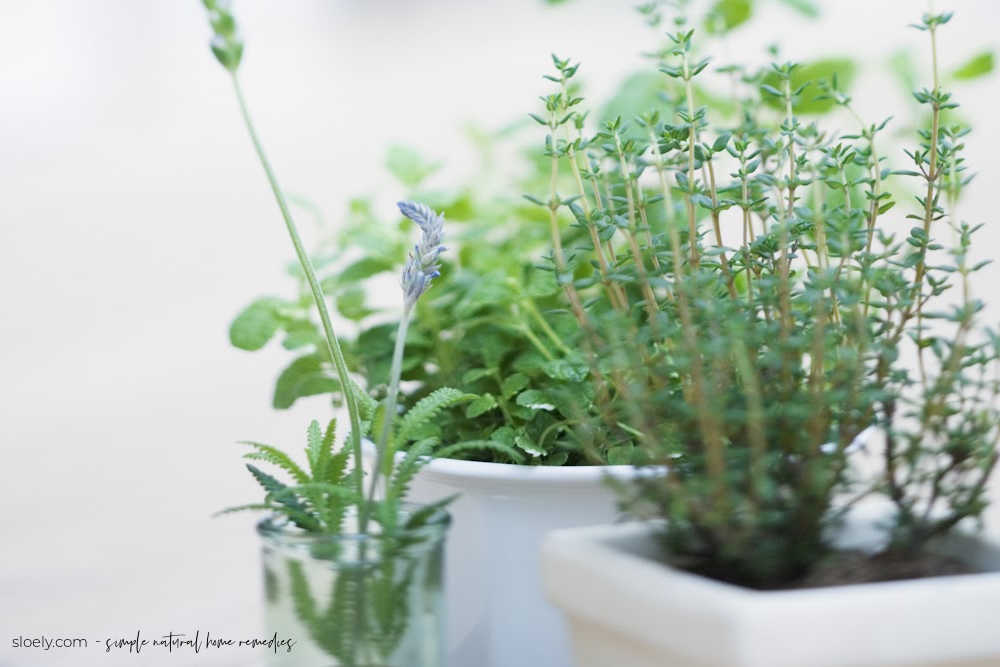
The least green fingered among us can easily start a healing herb garden inside or outdoors on a balcony or patio to grow the most useful natural antibiotics including :
I do hope these tips on using natural antibiotics help you deal with minor infections quickly and easily before they get nasty. Please do share with friends if they were useful.
And do let me know how you get on.
For more simple natural remedies do explore my other posts that are full of practical tips for healthier living with everyday store cupboard ingredients :
- Coughs & Colds
- Gut Health
- Skin Problems
- Better Sleep
- Inflammation
- Common Childhood Ailments including Worms, Lice & Sunburn
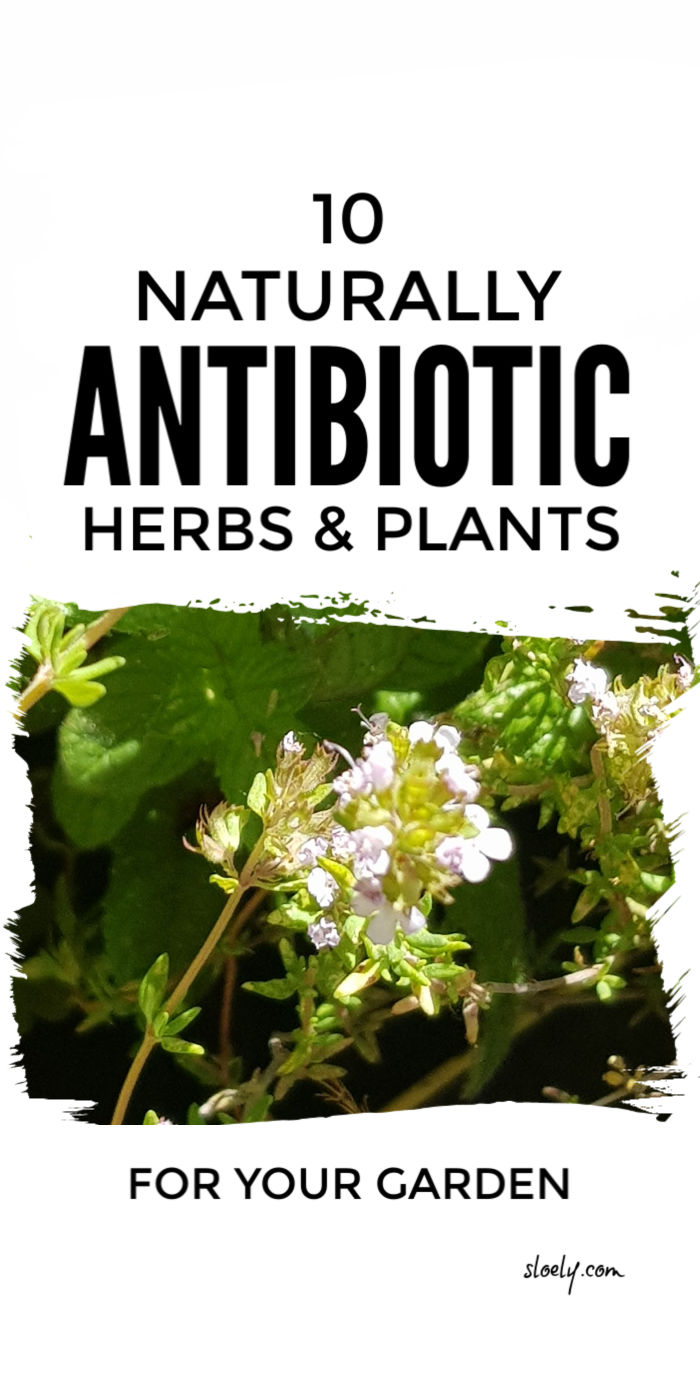 Original image sources: leaves, Herbal tea on wooden background, rosemary, herb garden, Sage, Green fennel seeds, Dry cloves
Original image sources: leaves, Herbal tea on wooden background, rosemary, herb garden, Sage, Green fennel seeds, Dry cloves

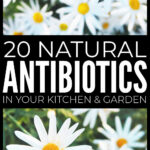
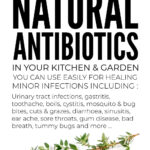
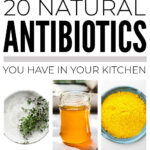
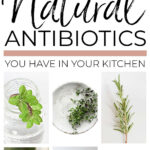
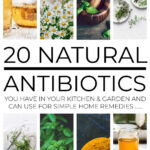
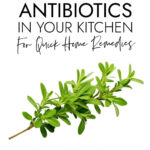


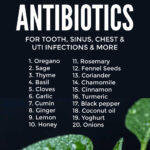
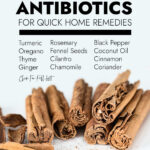
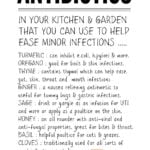
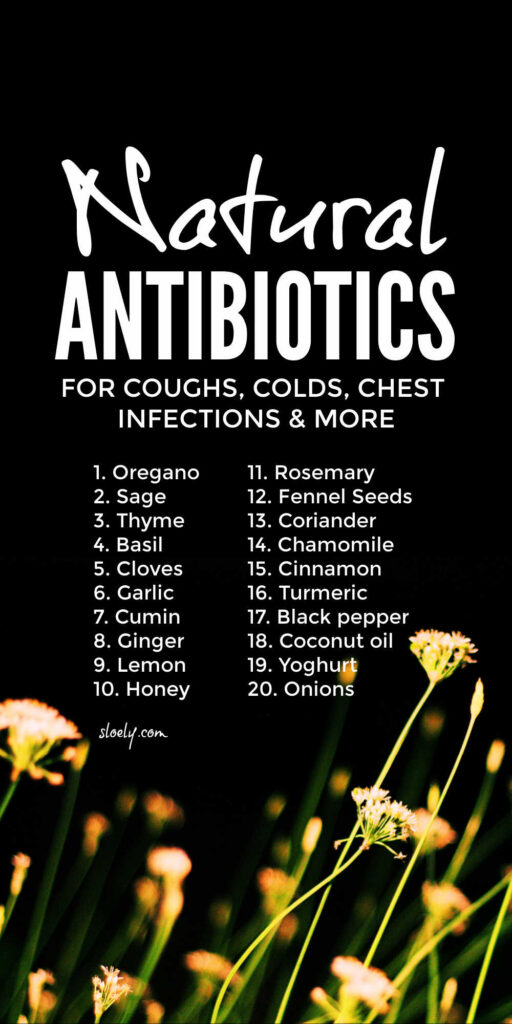
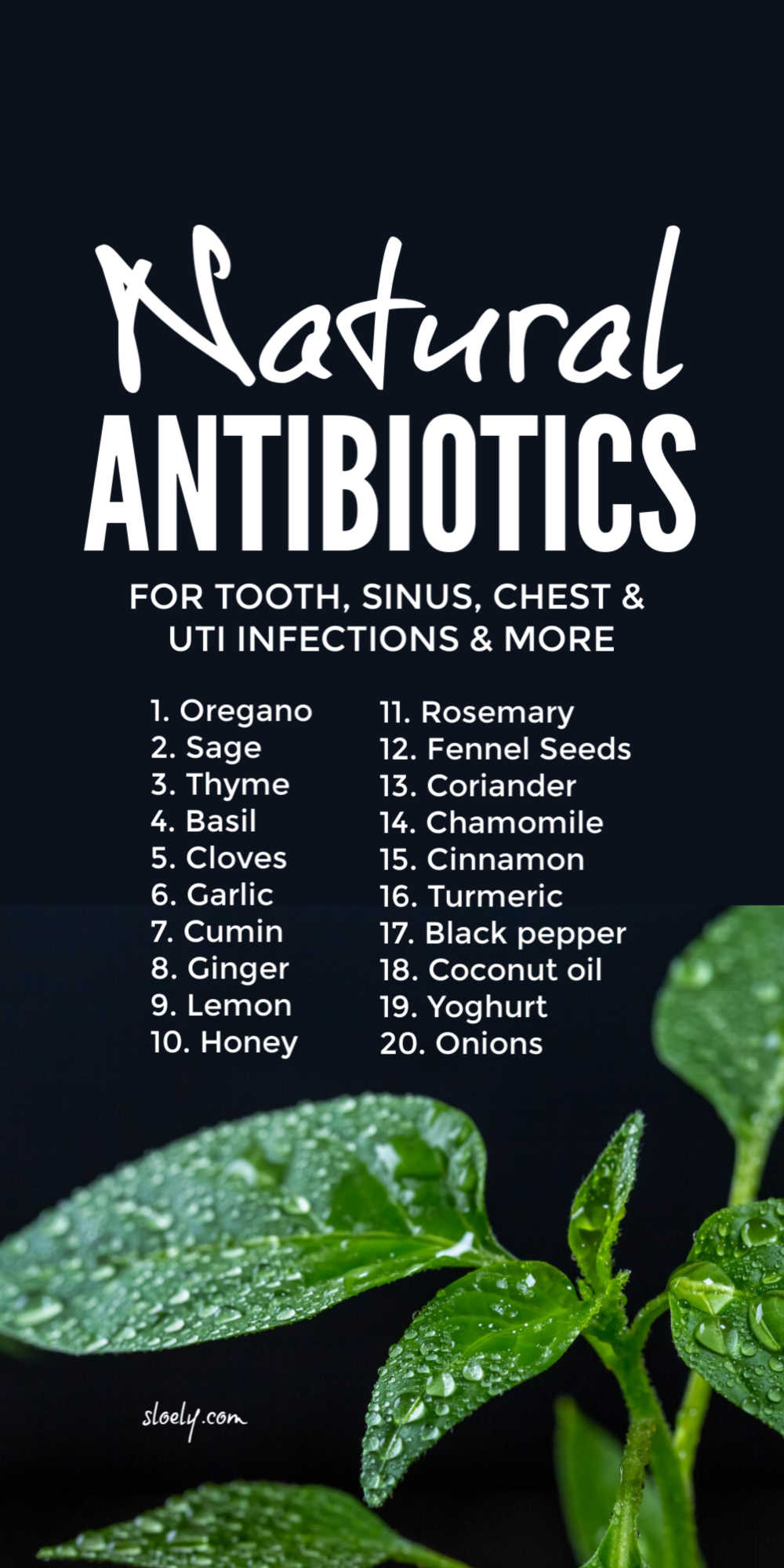
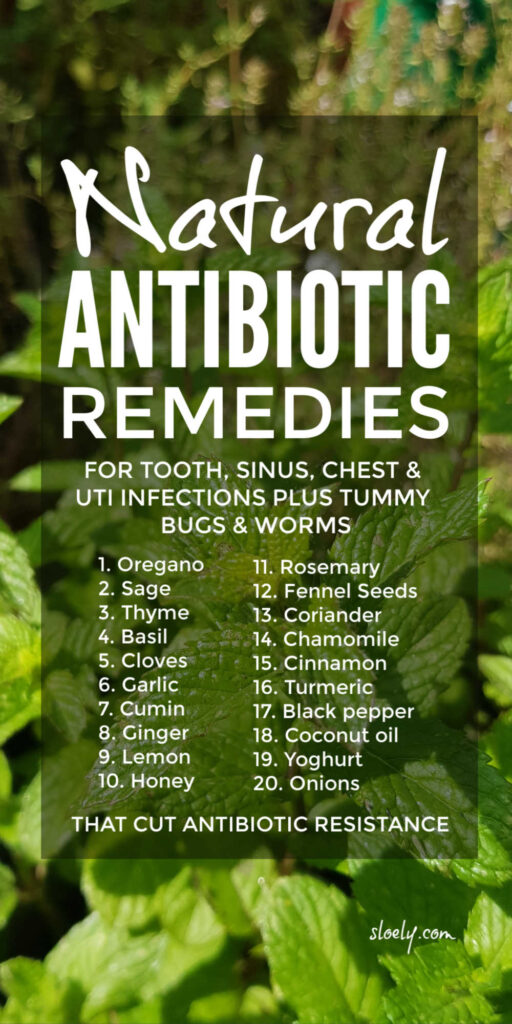
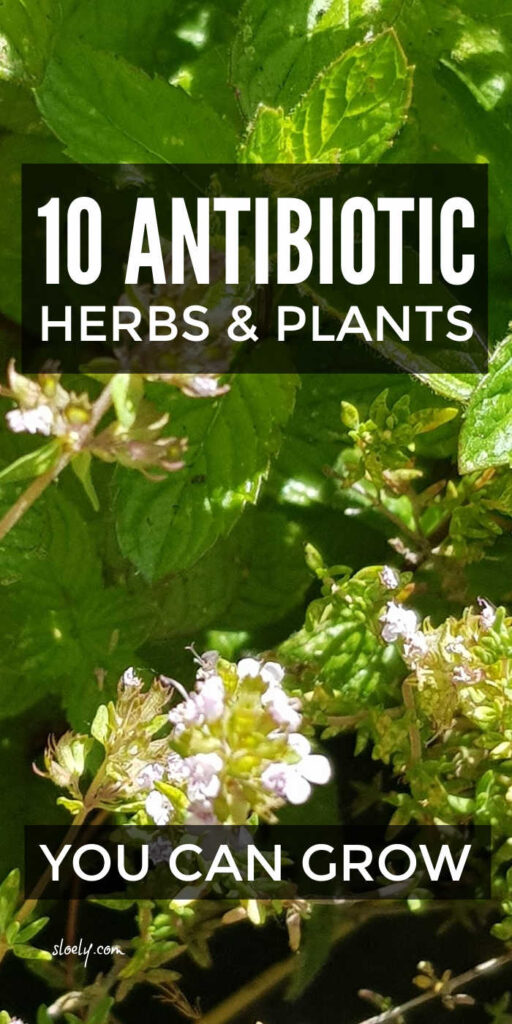
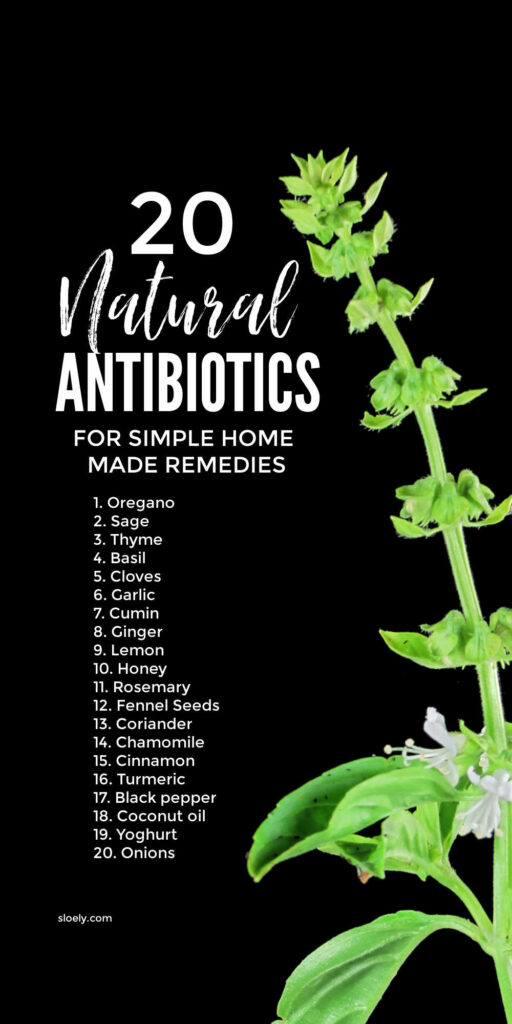
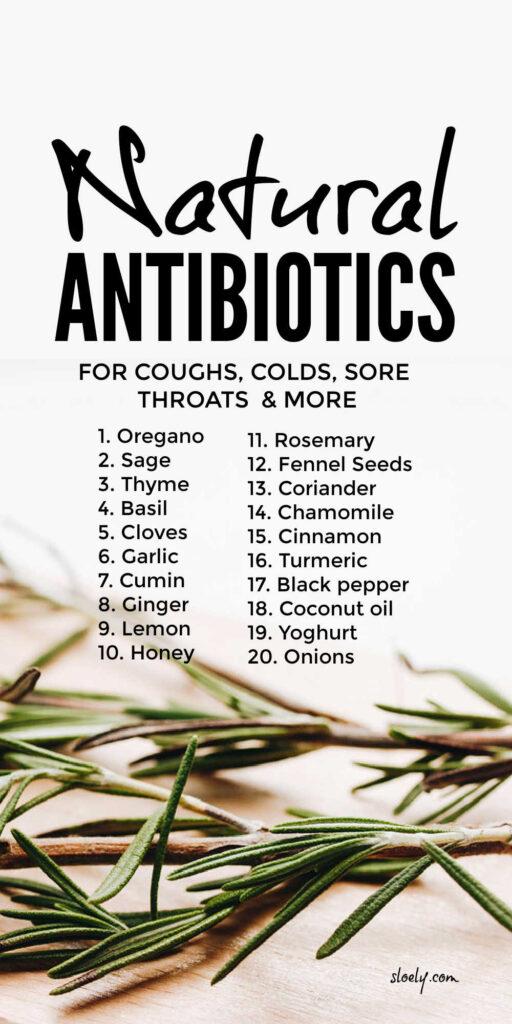




Gail lloyd says
Hi all love reading your column we love natural herbs we have most growing in the gatden
Essential Veda says
Oh, I love this, and need to read it again! you have the basics laid out so clearly! Great job,
Andreea Laza says
This is a wonderful breakdown of the top natural antibiotics. I most often use food-grade thyme oil at the very first flu symptoms and it always works like a charm. I posted on my natural remedies blogs about the top natural antibiotics and also how to safely use them at home. I leave a link here for those interested in learning more https://www.mynaturaltreatment.com/strongest-natural-antibiotics-use/ Many blessings! 💚🌿
Tina says
Tina Nolan, love this very educational and informative. I have learned so much and I love because it’s natural.
HolisticSoulHealings.com says
i can't wait to share this with my friends. thanks you! 😀
Farhan Bilal Khan says
I need for learning
Ella says
Always good information to have. Continuing to build my apothecary.
Iden kivunaga says
Thanks for the details
Jackie file says
Thank you for such a an in-depth summary of healing herbs.
Rosemary Orieji says
I love this. Thank you so much. Please I need more knowledge about natural anti biotic.
Barbara says
THANK YOU 🙏🏽 💘
Alice says
So glad it hit the mark Barbara!
Yaw says
Thanks,but any help for Typhoid treatment?
Alice says
These natural antibiotics are just for helping with very minor infections. Anything more than this needs qualified medical attention.
Dr. Sheikh Abdullah says
Thank you for sharing this excellent overview of top natural antibiotics! I personally rely on food-grade thyme oil at the first sign of flu symptoms, and it works wonders every time. I’ve written about the strongest natural antibiotics and how to use them safely at home on my natural remedies blog. For those interested in learning more, check out this link: https://homeopathinfo.com/homeopathic-remedies-for-urinary-tract-infection-effective-natural-treatment-options/ Many blessings! 💚🌿